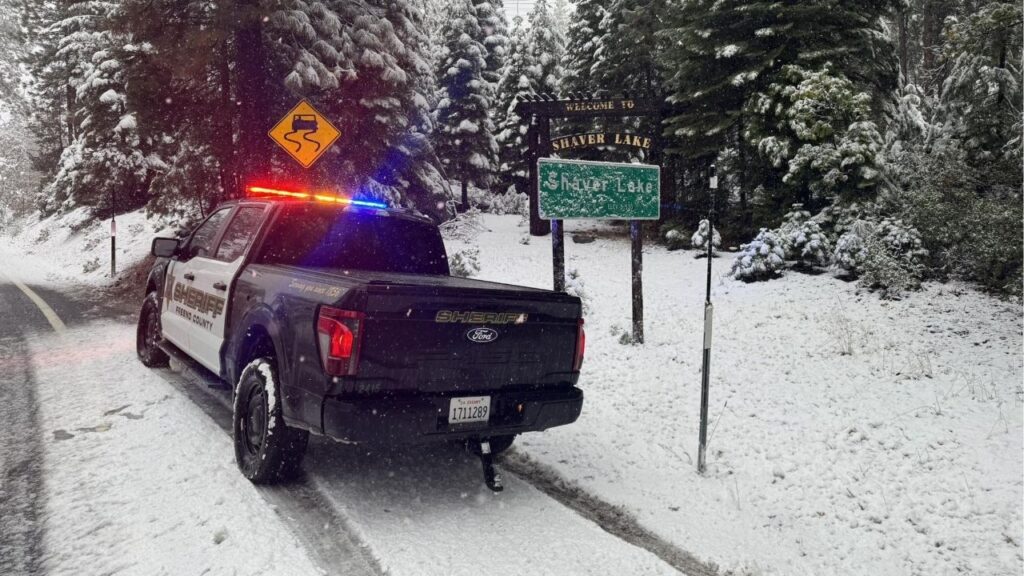Share
When Fresno County received it’s initial allotment of Moderna’s COVID-19 vaccine, it was clear there was a problem with at least some of the 14,800 doses received on December 22. It’s now clear just how big the problem was. Over a third of them are being returned.
A data logger that tracks the vaccine through travel to ensure it stays appropriately cold while being transported revealed the problem.
“We’ll be sending those 5,600 doses back. They’re stored separately from our our other viable doses,” said Joe Prado, the county’s health department’s manager who is engineering the local COVID-19 vaccine rollout.

“We’ll be sending those 5,600 doses back. They’re stored separately from our our other viable doses.”– Joe Prado, Fresno County community health manager.
Prado made the announcement during a New Year’s Day briefing with reporters. He also expressed some frustration with how long the state took to respond to his inquiry about the Moderna doses.
“There’s still some communication issues we’re working out with the state and CDC (U.S. Centers for Disease Control and Prevention) when there is an inventory issue on how quickly we can get a response back,” said Prado. “We would have liked a response a little bit sooner than what we got this time around.” Prado said he believes that communication flow will improve, though.
Governor Gavin Newsom says the Moderna vaccine deployment has been tougher than for the Pfizer vaccine because Moderna must go through intermediary distribution company McKesson. During a midday briefing Monday, Newsom said, “That has been a bit more of a struggle.”
Fresno County is not alone in dealing with the Moderna data logger issue. WFAA-TV in Dallas reports there were five shipments of the Moderna vaccine to Texas that could not be used due to “temperature excursion,” meaning the holding temperature was outside the recommended range.
The Texas Department of Health and Human Services said the federal government shipped replacements, which totaled 4,300 doses, to the facilities affected by the issue.
Meanwhile, the second doses of vaccines have arrived in Fresno County and are ready for distribution this week.
Vaccine Distribution ‘OK’ So Far
According to the latest numbers from the CDC, 13 million doses of vaccine have been distributed nationwide, but only around 4.2 million Americans have actually received it, reported WPVI-TV. This falls short of President Donald Trump’s goal of 20 million people getting vaccinated by the end of 2020.
Prado admits, “The pace we’re moving now (in Fresno County) is OK.” He says the coming weeks will reveal how well the rollout will go moving into late winter and early spring.

“I think January is going to be a very hard beginning to the year.”–Fresno County Interim Health Officer Dr. Rais Vohra
“These next three weeks are really key to establish some kind of foundation and be able to move forward a lot faster with distribution,” says Prado. “I think we’re going to get better in February and by March and April, the systems are going to be dialed in.”
Part of that increase in speed is due to additional partners being brought on board that can administer the vaccine. In mid-December, the county only had access to 10 providers that were qualified by the state of California to administer the Pfizer and Moderna vaccines. Part of that has to do with the cold storage requirements (Pfizer’s needs to be kept at minus 94 degrees Fahrenheit).
Fresno County now has 45 approved medical providers that can administer the vaccine, with another 40 in pending status. The county has also seeking proposals from other agencies and companies that could assist with vaccination.
Prado recalls the early days of the virus when the county struggled to get 300 COVID-19 tests done a day. That number is now about 6,000 a day.
“We’re pretty much building and designing the airplane while it’s in the air,” explains Prado. “Every day we get new rules, new regulations, every piece impacts the workflow.”
So far 32,000 total doses of COVID-19 vaccine has come into Fresno County. Of that, 53% has been distributed out to local healthcare providers, hospital systems, and some primary care physician clinics as well. Some primary care physicians have volunteered to assist with vaccinating other medical workers.
A ‘Very Hard’ January
With the Christmas and New Year’s Holidays behind us, Fresno County’s top doctor says the medical community is just bracing for what’s to come.
“We are very worried that the gatherings and other opportunities for transmission will lead to just just more cases and hospitalizations throughout January,” said Fresno County Interim Health Officer Dr. Rais Vohra. “I think January is going to be a very hard beginning to the year.”
The San Joaquin Valley region remains at 0% intensive care bed capacity, according to the latest state data. There are currently just 6 available ICU beds in the entire county.
Vohra says the county is working with hospitals and state agencies on plans for an even worsening surge.
“We’re bracing ourselves for what we know is going to be increased levels of transmission,” said Vohra.

“The California Department of Public Health is going to maintain a website that is a public access website where all outbreaks in California will be reported.”–Fresno County Department of Public Health Environmental Health Specialist Thomas Fuller
California’s New COVID-19 Exposure and Notification Law
A new law went effect on January 1, 2021 creating new reporting obligations and requiring employers of all sizes to provide written notice of their industrial and nonindustrial COVID-19 cases to employees and local public health officials, as well as the California Occupational Safety and Health Administration.
Employers are required to notify employees of a potential COVID exposure within one business day.
The new law also requires an employer with a “COVID-19 outbreak,” as defined by the California Department of Public Health to report information to the local health agency in the jurisdiction of the workplace within 48 hours of learning of the outbreak.
“The California Department of Public Health is going to maintain a website that is a public access website where all outbreaks in California will be reported,” said Fresno County Department of Public Health Environmental Health Specialist Thomas Fuller.
Statewide outbreak information is limited at this time, according to the CDPH. But, when information does become available it will be posted to this website.
The law will remain in effect until January 1, 2023. Employers who fail to comply with the new regulations are subject to civil penalties and citations.
[activecampaign form=25]RELATED TOPICS:
Categories

Three Pedestrians Injured in Madera Crosswalk Collision

Maxwell Refuses to Answer Questions in House Deposition

Fresno Man Pleads Guilty to $1.5 Million Tax Fraud

Caleb Quick Murder Transfer Hearing for Juvenile Delayed to April















